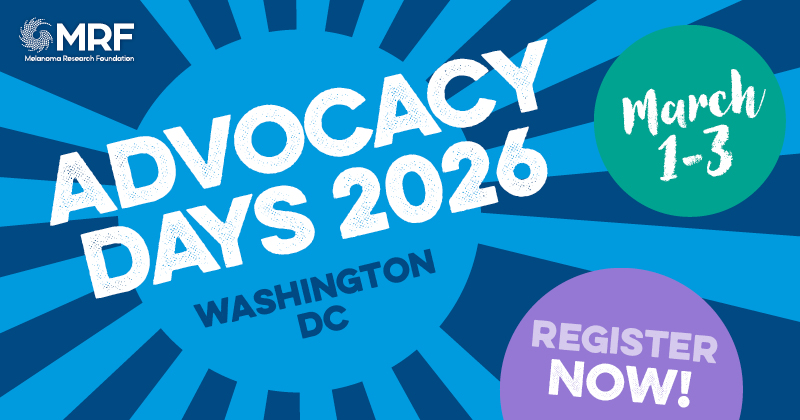January 27, 2025
Connect with Others
- Find Support through many resources offered by the Melanoma Research Foundation.
Biennial Pediatric Melanoma Summit
Please continue to check this resource page for information on future retreats.
Spot the Dog Resources
- Spot-ing Melanoma Early
- How to Use Sunscreen like Spot
- SunAWARE (free eLearning curriculum for children in K-5)
Online and Print Resources
- Questions to Ask Your Doctor
- Faces of Pediatric Melanoma video created by MD Anderson Children’s Cancer Center
- Sun Safety Coloring Pages
- Spot-ing the Difference May Save Your Child’s Life!
- Sunscreen and Your Daily Routine (English)
- Sunscreen and Your Daily Routine (Spanish)
- MRF’s Prevention is Key (English)
- MRF’s Prevention is Key (Spanish)
- Truth About Tanning
- MRF’s Pediatric Melanoma Specific Webinars[CG1] [lI2]
Support & Financial Resources
- Camp Quality USA: Overnight and week-long camps for young patients (some locations host siblings).
- National Children’s Cancer Society: The National Children’s Cancer Society offers financial assistance and 50 annual Beyond the Cure Ambassador Scholarships to childhood cancer survivors pursuing higher education, supporting their resilience and helping ease post-treatment financial burdens.
- SuperSibs!: A melanoma diagnosis can be difficult for everyone, but siblings of patients are put in a very difficult situation. They can feel scared, overwhelmed, alone and unimportant. Here are some resources from SuperSibs!, now powered through Alex’s Lemonade Stand Foundation, for siblings who are 4-7 years, 8-12 years and teens, as well as a place for siblings to share their stories.
- Imaginary Friend Society: A cancer diagnosis is scary for anyone, but for a child it can be even scarier. That’s where the Imaginary Friend Society comes in. A cast of characters inspired by the imaginations of kids themselves. Through a series of 20 animated short films, our imaginary friends explain a wide range of complicated cancer topics in a way that kids can understand.
- Still Strong Foundation: Offers financial grants to different hospitals across the U.S.
- SAMFund: The SAMFund provides financial assistance and support to young adult cancer survivors as they rebuild their lives after treatment. Grants help cover essential expenses like rent, medical bills, transportation, and fertility preservation, easing the transition back to everyday life and promoting long-term stability.
- Allyson Whitney Foundation: Allyson Whitney Foundation provides “Life Interrupted” grants to young adults ages 16–36 who are living with rare cancers. These grants help cover everyday expenses, medical bills, fertility preservation, and wellness services, supporting recipients as they navigate treatment and recovery.
- CancerCare: CancerCare offers free, professional support services and limited financial assistance to people affected by cancer, including young adults. Their programs help cover costs such as transportation, childcare, and home care while providing counseling, support groups, and education to address the emotional and practical challenges of a cancer diagnosis.
Life After Treatment
If your child has had a melanoma, they are at higher risk of developing new melanomas than someone who has never had a melanoma. They may be at risk of the cancer coming back in nearby skin or other parts of the body. The chance of recurrence is greater if the melanoma was thick or had spread to nearby tissue. Other members of your family also should have regular checks for melanoma, and everyone in the family should protect themselves from the sun’s harmful ultraviolet rays.
To increase the chance of finding a new or recurrent melanoma as early as possible, follow your doctor’s schedule for regular checkups and be sure to examine your child’s skin monthly (or have them do it themselves, if they are old enough to do it properly). Your care team may also recommend ongoing dermatology visits, and in some cases, genetic counseling if there is a strong family history of melanoma or related cancers.
If your child is at high-risk for recurrence, follow-up care may include x-rays, blood tests and imaging scans of the chest, liver, bones and brain. If your child was diagnosed with early stage (Stage I or II) melanoma, these tests may not need to be performed. For many children and teens, follow-up care now also includes tools like digital mole mapping or dermoscopy to track changes in the skin over time. Visit our Living with Melanoma section to learn more.
504 Plan
After a melanoma diagnosis, your child will qualify for a 504 Plan. This will help you as you navigate the school system and work with teachers and administrators to ensure that your child can go to school with sunscreen and other sun protection measures. It can also provide flexibility for medical appointments, recovery from treatment, or mental health support, which is an important part of survivorship for children and teens.
Emotional Support
A melanoma diagnosis affects the whole family. Children and teens may feel worried, isolated, or different from their peers, and parents often carry the stress of coordinating care. Support groups, counseling, and connecting with other families who have gone through melanoma can help your children, and your family, feel less alone. The MRF offers patient and caregiver programs, online communities, and peer connection resources designed for both parents and young people. Talking about mental health is an important part of healing, just like medical treatment.
General Cancer Support and Information
The resources below include trusted programs that provide reliable cancer information, practical support, and opportunities for connection. While many are helpful for patients and families of all ages, some peer and psychosocial programs highlighted toward the end are designed especially for children, teens, and young adults.
- American Cancer Society – Offers education, support services, transportation, and lodging resources for cancer patients and families.
- National Cancer Institute – Provides up-to-date, research-based information on cancer treatment, clinical trials, and statistics.
- CancerCare – Offers free professional support services, including counseling, financial help, and a searchable tool for local resources.
- Cancer Support Community – Nationwide network offering psychosocial support, educational programming, and community events.
- Cancer Hope Network – Connects patients and caregivers with trained volunteers who have faced similar cancer experiences.
- Help for Cancer Caregivers – A curated platform of practical tools and emotional support for those caring for someone with cancer.
- MD Anderson Network – Cancer support group resources from a leading cancer center, including survivorship tools.
Melanoma- and Skin Cancer–Specific Support
These organizations focus specifically on melanoma, skin cancer awareness, or advocacy:
- Skin Cancer Foundation – Offers patient education on melanoma and skin cancer prevention, detection, and treatment.
- Melanoma Just Got Personal – Raises awareness and shares real stories from people impacted by melanoma.
- Faces of Skin Cancer – An online space for individuals with advanced skin cancer to share their experiences.
- Mike Geltrude Foundation, Mollie Biggane Melanoma Fund, and Bill Walter III Melanoma Research Fund – All of these organizations support melanoma awareness, fundraising, and education through advocacy, events, and storytelling.
Peer and Psychosocial Support
These programs offer one-on-one or community-based emotional support:
- Imerman Angels – Matches patients and caregivers with trained peer mentors (“Angels”) who’ve been through similar experiences.
- AIM at Melanoma – Connect with a Peer – Offers a peer-to-peer support program that connects you with someone who understands what it’s like to face melanoma. This can be especially valuable for those with rare subtypes like acral melanoma.
Supportive Resources (Children, Teens & Young Adults)
The resources below are specifically designed for children, teens, and young adults affected by cancer. They offer age-appropriate information, emotional support, peer connection, and practical tools for families navigating melanoma.
- Elephants & Tea – A magazine and community created by and for adolescents and young adults (AYAs) with cancer, featuring personal stories, writing workshops, and caregiver resources.
- Stupid Cancer – A national advocacy and support network focused on the unique needs of AYAs, offering meetups, digital programs, and the annual CancerCon conference.
- Teen Cancer America – Builds hospital programs and community resources designed specifically for teens and young adults with cancer.
- Cancer Support Community – MyLifeLine – Free online community platform where young patients and caregivers can connect, share updates, and access AYA-focused programming.
- CancerCare – Offers free professional counseling and support groups, including programs tailored for children, teens, and young adults.
- Fox Chase Cancer Center – Young Adult Cancer Program – Provides support for young adults ages 18–39 through virtual groups, fertility and sexual health guidance, financial navigation, school and work support, and psychosocial services.
If you know of a melanoma-specific resource for young adults that is missing from this list, please email education@melanoma.org.
Additional Links
AYA Resources
Cancer Centers Focused on the AYA Population
Organizations Focused on the AYA Population





